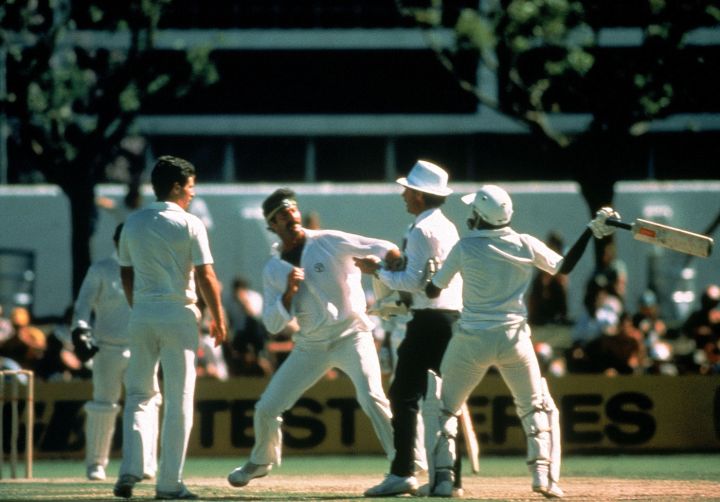What's competitive about ugly on-field behaviour?
Today's on-field aggro is no better than the worst kind of bullying by schoolboy thugs. It's time to outlaw such conduct

"Competitive sport is so ugly," my son's class teacher said to me in a voice that suggested quietly but firmly that she knew better than I did. This was in response to my proposal that the school's children who had sporting talent be permitted to compete in local tournaments, and that the school field cricket and football teams in competitions in the city.
The school, run by the Krishnamurti Foundation India, does not encourage competition in any form. I was attending a PTA meeting, and impressed by the talent of the budding cricketers (of whom young Anand Vasu, later a prominent cricket writer, was a promising paceman) and footballers of the school, I felt that the school was unfairly denying the kids a chance to pursue sport seriously. "Why shouldn't they go out and participate in tournaments? They compete the moment they step on to the ground, don't they, even if only in intra-school games?"
I was a little annoyed with the young teacher, who spoke in a condescending tone (after all, I was a mere former cricketer), more so because I had seen her first in pigtails and school uniform as she waited for her father (my boss) at my bank office back in the 1970s. "You are speaking to a man who has spent more than 30 years of his life as a cricketer," I said. "The game has taught me so many valuable lessons - to accept defeat sportingly, to be a team person, to accept the umpire's decision without dissent, to be magnanimous in victory. The game is ideal preparation for the ups and downs of life," I went on, all to no avail.
I came away feeling dejected and deflated, but also irritated at how indoctrination or conditioning can render a perfectly nice person smug and dogmatic, but not for a moment was I beset by self-doubt. I refused to believe that cricket had made me an ugly person.
Now, older, and hopefully wiser, I'm not so sure the teacher was far off her mark, especially after witnessing or reading about the verbal excesses of Australian (and English) cricketers in the ongoing Ashes series. "What happens on the field should stay there" is a popular assertion that makes no sense to me. What it means is that you can question your opponent's parentage or pepper him with dire physical threats with all the collective menace at your command, but you cannot breathe a word of it once you cross the boundary. Instead, you must hug and shake hands over the inevitable post-match pint or two with foe-turned-buddy.
Yet verbal excess or sledging does not seem to end on the field of play. Nowadays it is perfectly in order for rookie David Warner to make crude comments about the psyche of a senior, worthy opponent like Jonathan Trott. Immature as Warner's revelation that he saw fear in the eyes of English batsmen was, it would have been less damaging if Trott had not later withdrawn from the tour citing stress. (Though not always rude or insulting, much of the sound bites that junior members of international cricket teams proffer, and television and print journalists unprotestingly lap up as the gospel truth, before or after matches is about as edifying as advertisements for soap).
Verbal and physical confrontations on the cricket field are not exactly new. We cannot forget the infamous Dennis Lillee-Javed Miandad fracas in Perth in 1981, or the Rashid Patel-Raman Lamba episode in a 1900-91 Duleep Trophy match, but these were instances of unbridled aggression in the heat of the moment, not premeditated acts of provocation, made vulgar by the contempt of the aggressor for the victim, usually a hapless batsman already facing a barrage of fast and furious deliveries. Even Freddie Trueman's jibes at clueless batsmen were rarely offensive in the manner today's diatribes are.
Today's on-field aggro is no better than the worst kind of bullying by schoolboy thugs. How can such anti-social behaviour be an integral part of the so-called killer instinct alleged to be essential for sporting success?
Players in the distant past were no saints, but the verbal taunts before the Steve Waugh-led "mental disintegration" epoch were not often vicious; they were frequently softened by humour. I remember a nice little exchange in a local game in Chennai 30 years ago. The close-in fielders and wicketkeeper of a team desperately chasing league points were trying to persuade the stubborn Nos. 10 and 11 of Integral Coach Factory to throw their wickets away. "Humne ICF ka namak khaya hai, bhai [We are loyal to ICF, guys]" was the friendly retort. The duo managed to draw the match as well.
With nervous breakdowns and victims of depression now rife in the game, why can't cricket outlaw on-field misbehaviour like tennis did? Do we really believe that it will make the game less competitive? I, for one, do not.
V Ramnarayan is an author, translator and teacher. He bowled offspin for Hyderabad and South Zone in the 1970s
Read in App
Elevate your reading experience on ESPNcricinfo App.